In the pursuit of fostering more equitable and just communities, a paradigm shift toward non-violent, non-police crisis intervention strategies is imperative, particularly given the embedded racism within our current police and criminal justice systems.
It’s really, really a misnomer to say that the only response [to] people in crisis can be a response that involves the tools of force, like a badge, a gun, and handcuffs.
Timothy Black, consulting director for White Bird.
Acknowledging the long-accepted ideas about law enforcement, we must recognize that traditional methods often disproportionately impact dispossessed (deprived of property, land, shelter, etc.) communities. When we hear about police interventions, it triggers reflections on systemic biases that have persisted throughout history.
Black people, who account for 13 percent of the U.S. population, accounted for 27 percent of those fatally shot and killed by police in 2021, according to Mapping Police Violence, a nonprofit group that tracks police shootings (NBC News). From 2013-2024, Black people are 2.9 times more likely to be killed by police than white people in the U.S. As of May 15, police have killed 407 people this year. There have only been nine days so far in 2024 when police did not kill anyone in the United States (Mapping Police Violence).

Southeastern Michigan, with its diverse population, is not exempt from these disparities. Communities of color face heightened challenges and injustices. A non-violent, non-police crisis intervention approach offers an alternative that can address the racial disparities ingrained in our current systems, fostering a safer and more equitable environment for all.
When contemplating law enforcement, many associate it with ensuring public safety. However, a growing body of evidence suggests that our traditional systems contribute to systemic racism and unequal treatment. Acknowledging the roots of these challenges is the first step toward dismantling them and establishing a foundation for a fairer society. Since the 1980s, many police departments have established Crisis Response Teams (CITs). In theory, these teams are designed to recognize and deescalate situations in which the individual is having a mental health crisis. These are not working at the scale needed. Experts attribute two main issues to their failures: the CIT model and subsequent trainings are viewed as cumbersome administrative tasks for officers and cities often “fail to integrate CIT into the wider behavioral mental health care system and route calls away from police.” (NPR) A study from the Brennan Center for Justice reveals that communities of color are disproportionately affected by aggressive policing tactics, leading to higher rates of arrests and convictions (Brennan Center). This underscores the urgent need to reevaluate our crisis intervention methods.
United Way’s Racial Equity Fund partner, Care-Based Safety, sees the need for a non-police intervention strategy. Their mission is to design and resource a non-police response program that will grow life-affirming and care-based safety options and opportunities for all in Washtenaw County. CBS-Response is the unarmed, non-police response branch of Care-Based Safety’s programming– the program includes a crisis phone number that is independent from 911, a dispatch system, two-person response teams who go directly to the site of conflict or crisis, and a volunteer-based peer support program. The Community Building programming supports CBS-Response by teaching skills, sharing resources, and building resilient relationships within communities so that they can respond to crises within their own neighborhoods, families, and networks. Combined, the program works to de-escalate and stabilize crises through nonviolent interventions; and assist people in creating more interconnected and resourced relationships to prepare for and prevent future crises and harm.
As we contemplate the adoption of non-violent, non-police crisis intervention strategies, it is crucial to recognize that change requires collective effort. By embracing alternatives that prioritize equity and justice, we can reshape our communities, fostering an environment where everyone feels safe and valued, regardless of their background. In Southeastern Michigan, this shift is not only necessary but also a testament to our commitment to building a future free from systemic racism and inequality.
Today's Challenge
Read
- Mental Health And Police Violence: How Crisis Intervention Teams Are Failing. This article from NPR outlines the history of Police CITs and catalogues their failure to meet their objectives. It also provides additional support for non-police response to mental health crises. (10 minutes)
Watch
- Watch this report from Fox 2 Detroit on Ann Arbor’s support of an unarmed crisis response team and how we can reimagine the way we respond to our most vulnerable residents. (2 minutes)
Listen
- An interview with Tim Black of the White Bird Clinic in Eugene, Oregon about the CAHOOTS program, a community-based public safety model that provides mental health first response for crises involving mental illness, homelessness, and substance use disorder. (30 minutes)
- The University of Michigan School of Public Health’s Population Healthy Podcast discusses the rationale for developing and implementing alternative response programs to policing informed by public health principles of care, equity, and prevention. (24 minutes)
Engage
- Visit Care-Based Safety’s website to learn more about their work to normal non-police response to mental health crises. (5 minutes)
Reflect And Share
- How are you feeling after today’s challenge? What is resonating with you?
- How does the acknowledgment of long-accepted ideas about law enforcement resonate with you?
- How do you envision non-violent crisis intervention strategies contributing to a more equitable and just society in southeastern Michigan?
- How do you envision non-violent crisis intervention strategies contributing to a more equitable and just society in southeastern Michigan?